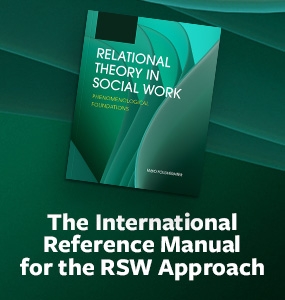Editorial
Fabio Folgheraiter
Catholic University of Milan, Italy
The pandemic crisis caused by Covid-19 had a strong impact both on welfare organizations, and social workers’ engagement, and on service users’ and carers’ conditions. The ongoing health emergency has also affected social work education and social work students’ university training. For these reasons, the Relational Social Work Journal launched a call for research papers to be included in a Special issue on changes and challenges faced – and still ongoing — in social work because of the Covid-19 pandemic. Several academics, researchers and social workers have been proposing to our Journal interesting theoretical contributions, empirical studies and research, as well as stimulating papers focused on social work practices aimed at coping with known and new needs generated by Covid-19.
Therefore, I am pleased to introduce this new issue of the Relational Social Work Journal.
In the first paper, I propose a theoretical reflection on the lessons learned during the Covid-19 pandemic. This unexpected crisis put welfare organizations to the test but, at the same time, offered social workers, managers and policymakers essential learning opportunities on being more sensitive to and respectful of their own and other’s vulnerabilities. Today more than ever, it is necessary to concentrate on the «human» element.
Next, Cabiati and Turati present in their paper a social work education activity conducted in Italy during the COVID-19 pandemic. After reading the book ‘Medical Nemesis. The Expropriation of Health’ written by Ivan Illich, students were invited to write an imaginary letter to the author. The article reports interesting findings emerged from the content analysis of the students’ letters. Their reflections show the deep connections existing among the author’s thoughts, their experiences during the ongoing pandemic and some key concepts of social work.
Jungmann and Wilken present an article on the findings of an explorative study about the social impact of the Covid-19 crisis in the Netherlands. The authors describe its specific impact on several areas of social work, and, generally, on social life and psychological well-being of people. The paper highlights the importance for social workers to find new ways of being and staying in contact with service users, groups and communities. Interesting reflections on the use of digital communication media in the social work field are offered.
About the effects of Covid-19 on social services, we appreciate an empirical study carried out by Sanfelici, on the repercussions of the pandemic on residential care facilities for the elderly in Italy. The study aimed to give voice to front line social workers, highlighting emerging challenges within residential care settings, and how they tried to cope with them. The research findings highlight the crucial role played by social workers in providing socioemotional and relational care to seniors and the importance given to life aspects that go beyond the technical treatments applied to cure physical pathologies.
Nilsson and Olaison from Sweden propose an article on the need for assessment procedures in elderly care. The authors analyze two different approaches to assessing services provided to older people during the Covid-19 pandemic. The findings show the importance of supporting innovative approaches in remote assessment but also the importance of technical training for managing difficulties and challenges connected to the current digital environment.
Finally, the Journal presents an innovative community social work project carried out by a social work student during the Covid-19 pandemic. The project aims to promote local community members’ equal access to the formal and informal aid activated in response to the needs created by Covid-19. The authors present this field experience, highlighting its connections with the principles and key ideas of Relational Social Work.
We would like to conclude thanking all the authors for their valuable contributions to our Journal. We hope that this issue will contribute to stimulate reflections and produce knowledge on Relational Social Work, social innovations and challenges arising from the ongoing health emergency.
Milan, October 2020




